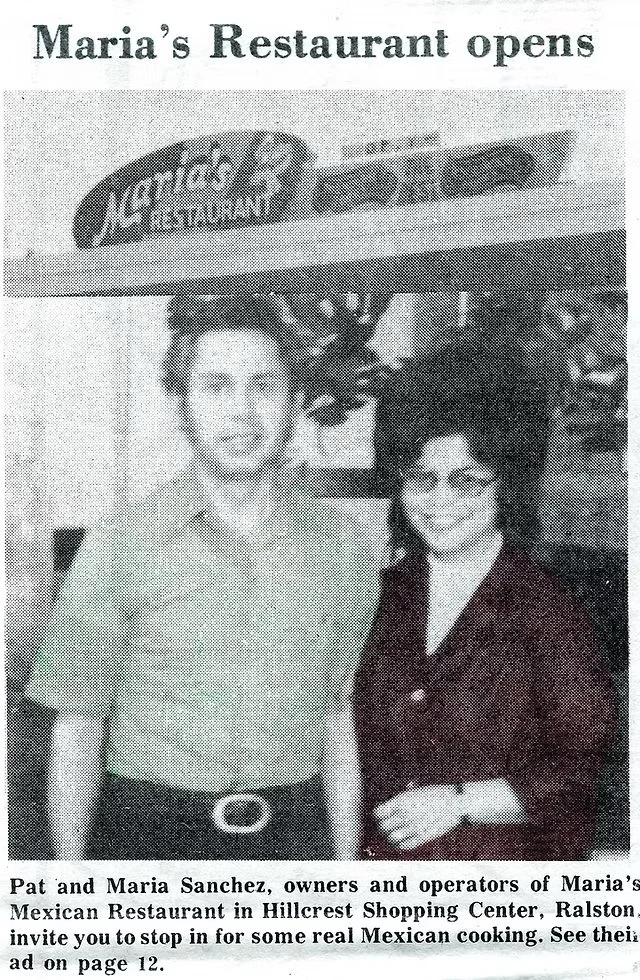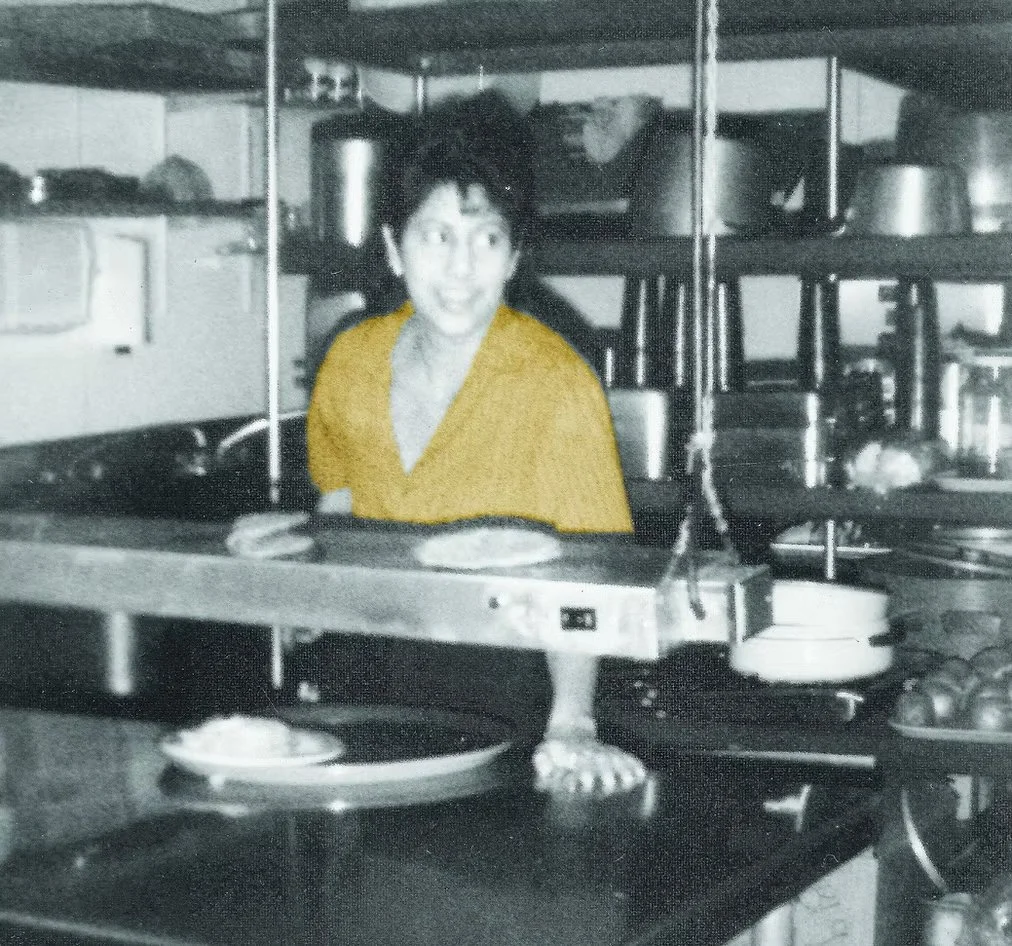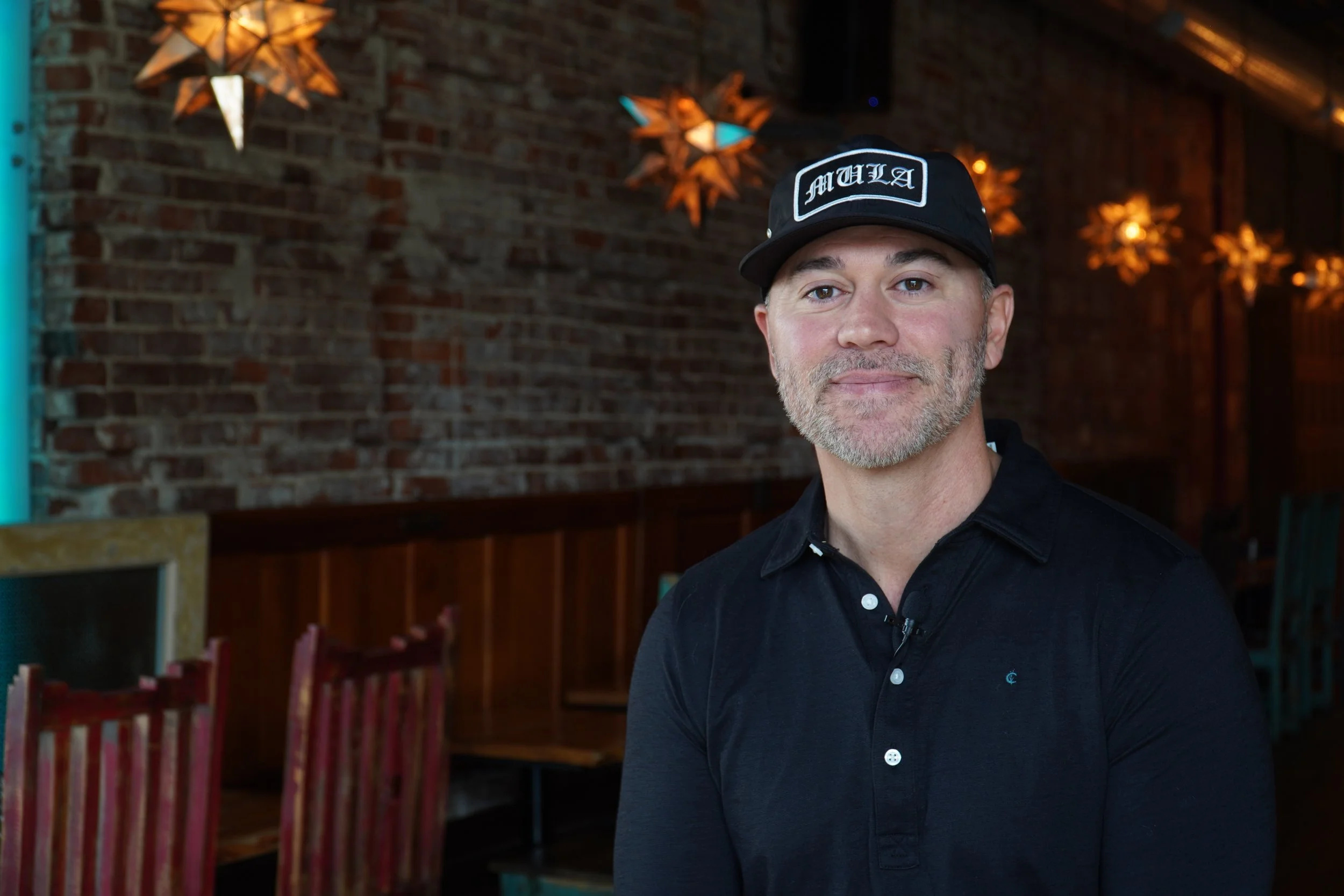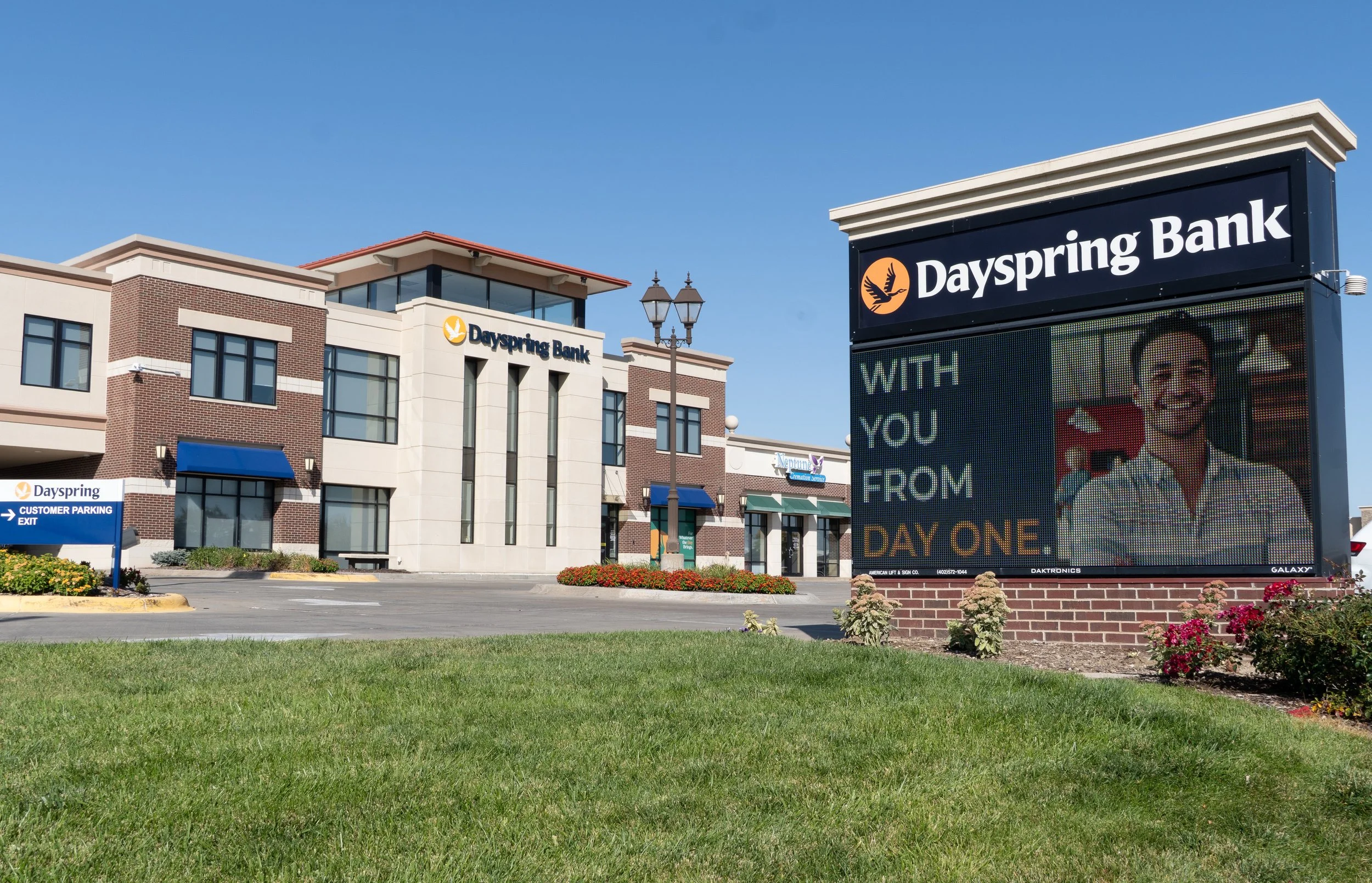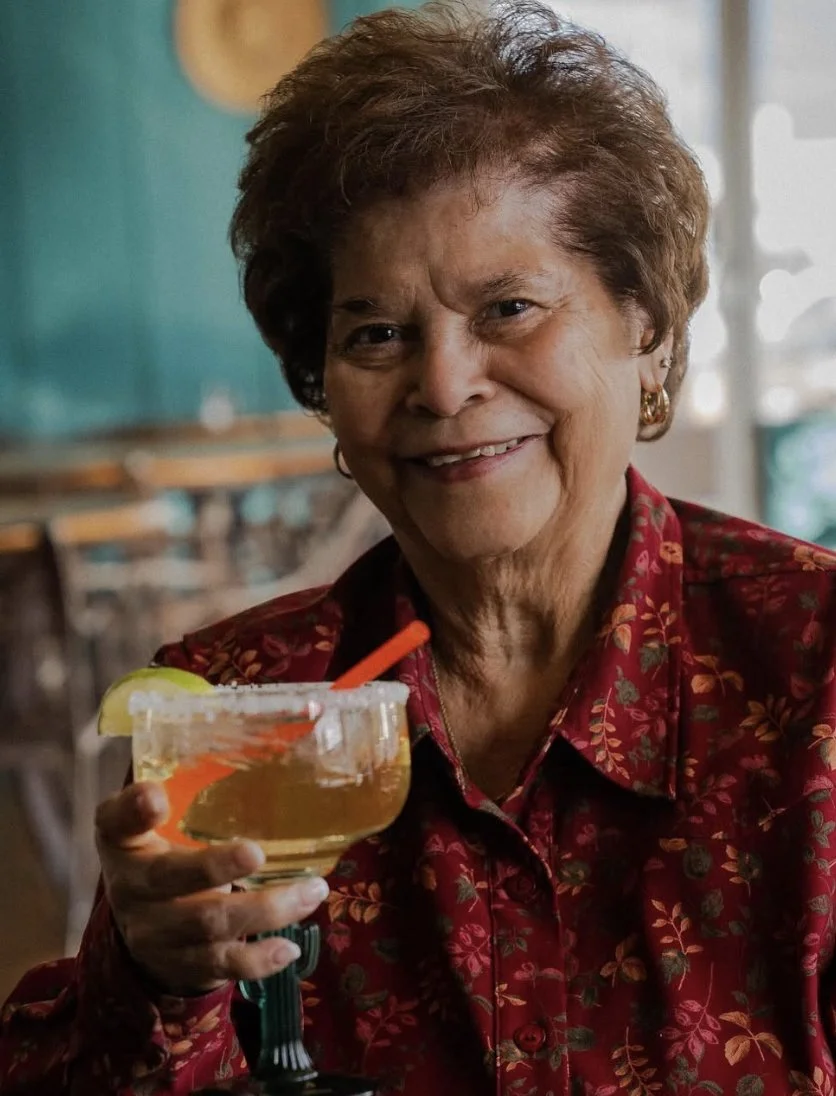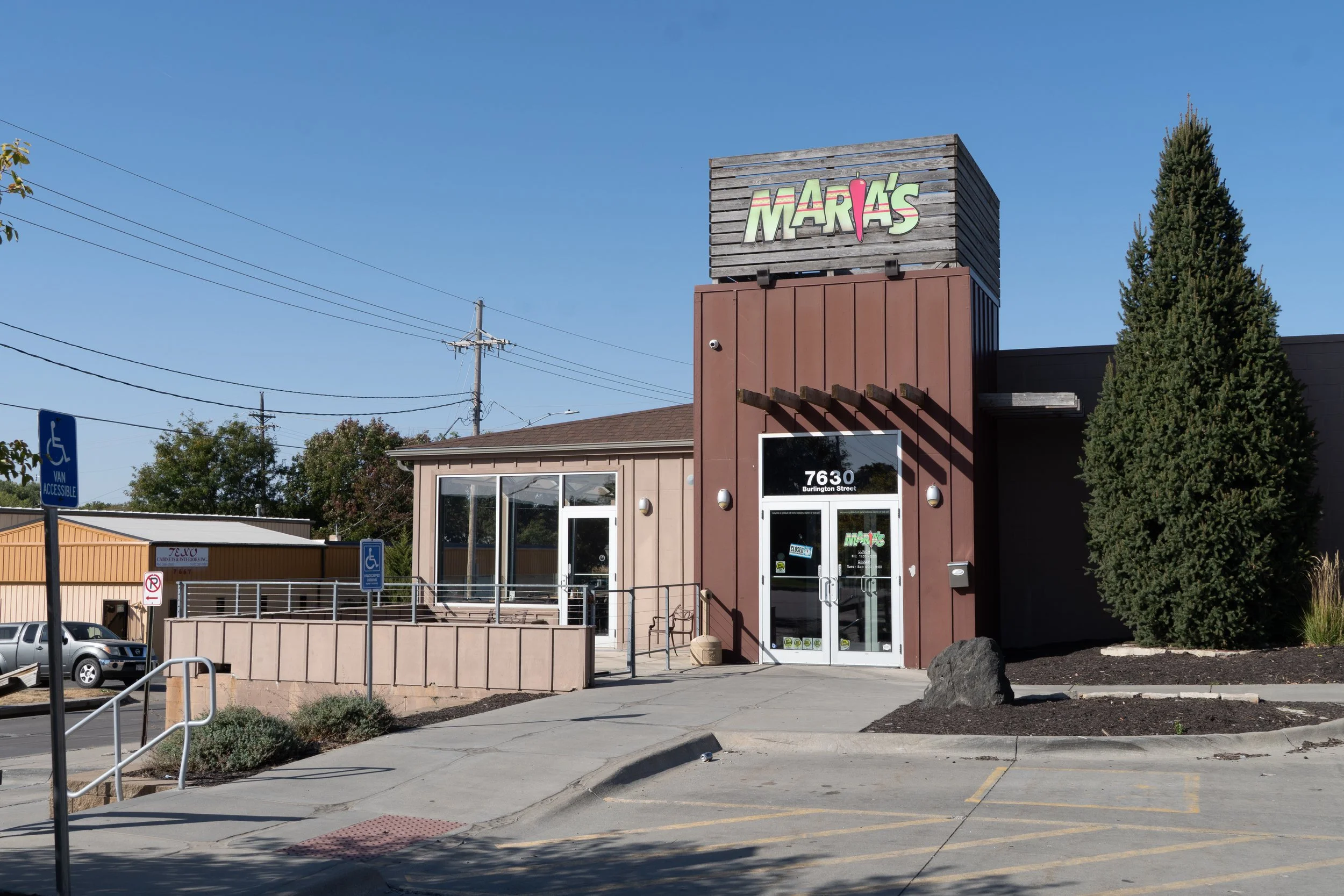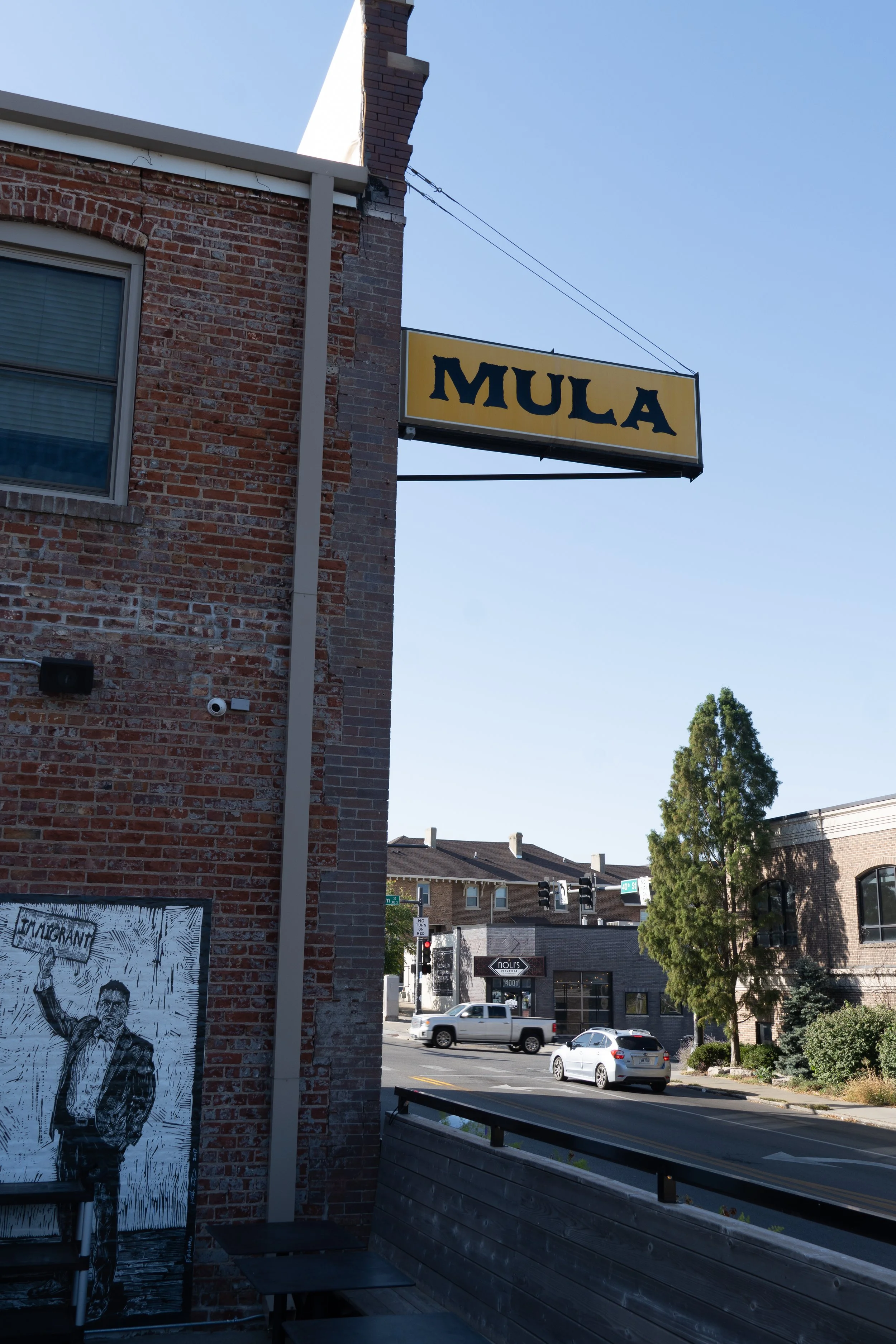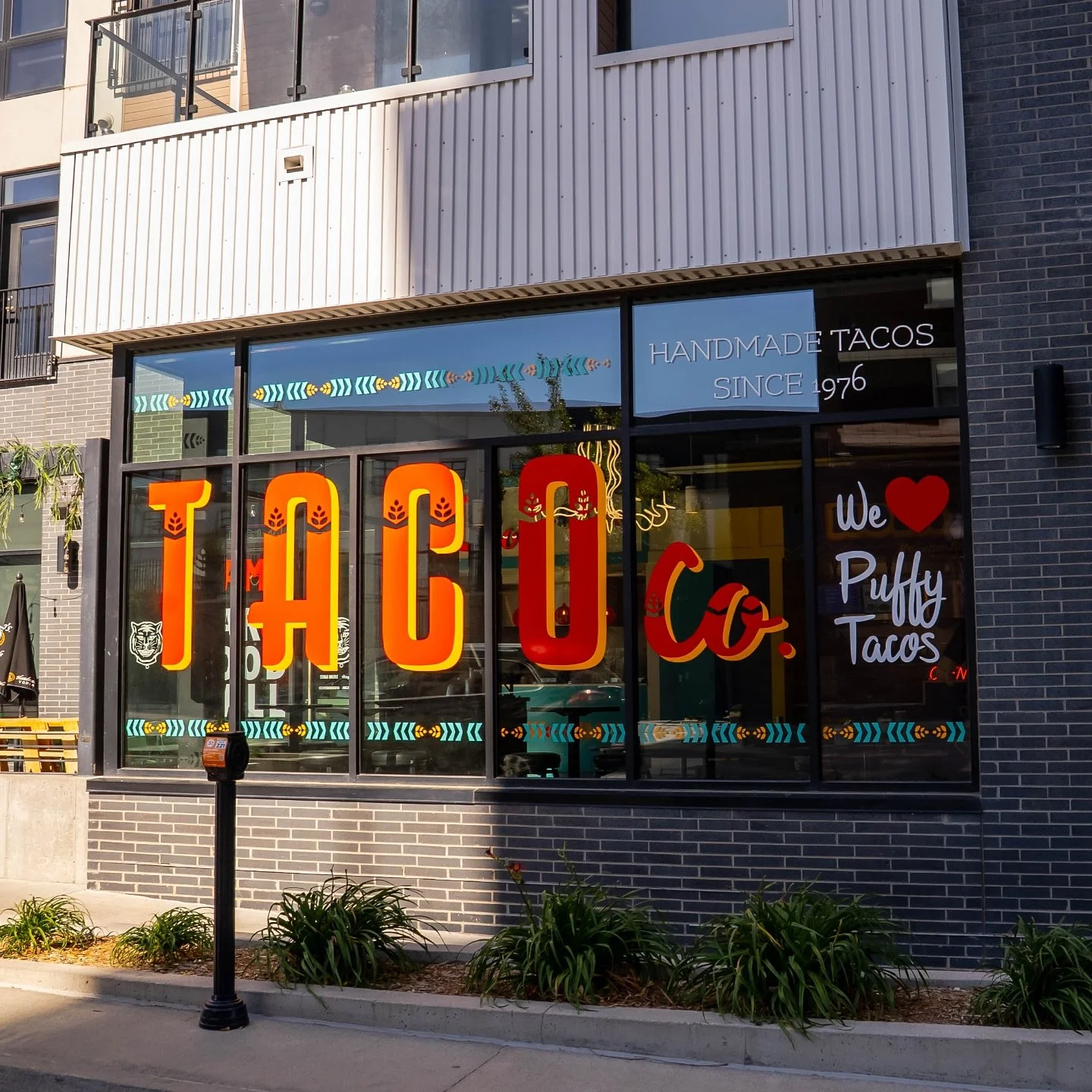Michael, Maria & Mula: How a Local Community Bank Helped Reinvigorate Ralston
Michael Sanchez never intended to come back to Omaha. He certainly never planned to take over his family’s restaurant, let alone expand it into a thriving restaurant concept and hospitality business spanning multiple locations. But sometimes, circumstances have a way of leading people back to where they can make the most impact.
Growing up, Michael’s world revolved around his grandmother’s restaurant, Maria’s in Ralston. He didn’t just spend time there—he lived it. “It sounds a little cliche, but I really did grow up in the restaurant,” he says. “My crib was in the back. My first school desk, my VHS player, my Nintendo—everything was there,” he recalls.
Pat and Maria Sanchez outside the original Maria’s—where hard work met heart, and where Michael’s love for community and entrepreneurship was born.
Maria, his grandmother, was so much more than a restaurant owner and businesswoman. Truly, she was (and still is) a pillar of the small historic Ralston neighborhood tucked into the southwest corner of downtown Omaha where Michael spent his boyhood. “She’s the hardest-working person I’ve ever met,” Michael says of his grandmother. “I've never once heard her complain about work,” laughs Michael, noting that the restaurant business can be fast-paced and stressful with a lot of moving pieces. “I've never once heard her complain about her job. I've never even seen her stressed about her job. She just did the work. And everyone–customers and employees–became family.”
Maria led by example, quietly shaping a culture of grit, grace, and community that would endure for generations.
After 50 years in Ralston, Maria’s is inextricably linked not only to what it is today, but to its complex history. Today, it’s a thriving community marked by quaint commercial structures, trendy industrial vibes, and red brick patios–but it wasn’t always so.
A Return Home—and a Big Decision
Michael had big ambitions beyond Omaha. He earned a degree in finance from Cal State and, amid starting a family, had begun to build a lucrative career. “I had promised myself two things: I wasn’t coming back to Omaha, and I’d never be in the restaurant business.” He says, smiling at the irony. His expression is calm and affable under the bill of a black hat that reads MULA in Chicano-style graffiti lettering–the kind that draws heavy inspiration from Old English and blackletter calligraphy. Then, something changed.
In regular calls with his grandmother, the topic of the restaurant’s future had certainly come up. “When I was gone for those eight years, we talked at least once a week,” he says, “I knew what was going on with her; she knew what was going on with me. And those conversations started to become more serious.” Maria was ready to start stepping back, but there was no real succession plan. “I felt a responsibility,” says Michael. “If I didn’t do it, Maria’s would close, and I couldn’t let that happen.”
Michael Sanchez returned to his roots in Omaha not just to carry on a family legacy, but to breathe new life into it.
A few years into his finance career, Michael was in his mid-20s and doing well for himself and his growing family. Maria’s was also doing well, but leaving the Bay Area to run the family restaurant meant sacrificing a significant portion of their income. It was a daunting trade-off.
“I remember thinking, If I made that move and needed to supplement my income, how could I grow this business?”
He also wrestled with the complexities of his own identity. “I was moving back to a place I told myself I would never move back to–not because I don't love Omaha. I absolutely love this city, but I wanted to create my own path,” says Michael. “I never wanted to feel like my life and success were a result of nepotism or that it was handed to me. I wanted to blaze my own trail.” At the same time, like so many multi-generational business leaders, Michael felt a gnawing loyalty to his family, and everything they had built. “I felt a sense of responsibility like, you know, my grandparents poured their heart and soul into this, and there's no one to do this.”
Meanwhile, Ralston itself presented some challenges that made the business calculations even more complex. Though once a tight-knit community with a distinct small-town identity, Ralston faced economic stagnation heading into the 2000s, as suburban expansion and shifting commercial developments drew business away from its aging infrastructure.
“It’s especially unique in that it’s land-locked,” explains Michael, now in his 40s. He’s relaxed and easy-going. He slips easily between the nostalgia of childhood and complex topics like scaled growth, calculated risk, and capital reinvestment in plain, unpretentious language. “It’s a mile by a mile, but it’s landlocked by the greater metropolitan area,” he adds. “In a city like Omaha, when you want to grow there’s land to grow into–you can grow west, you can grow in every direction. There’s no geographic growth opportunity for Ralston, so you really have to take what you have and make it better.”
Ralston’s tight boundaries mean every investment counts, making revitalization a true labor of love.
What’s more, taking over an established business isn’t as simple as stepping in. Michael needed to grow the business, but Maria’s had a loyal following, and drastic changes risked alienating the community. His next step was practical, disciplined, and generally unglamorous: “I wrote a business plan,” he says. “I knew if I didn’t have a plan, there was no point in coming back.”
The plan? Expand Maria’s physical space to double seating capacity, increase revenue, and modernize the brand without losing its soul. But for that, he needed capital.
Finding a Banking Partner Who Gets It
Michael had always held relationships in high regard, particularly in business. “One thing my grandparents instilled in me is the importance of having a relationship with your bank,” he explains. “They always stayed away from the larger national banking institutions, because they knew they were just a number and weren’t able to have a relationship–so that was really, really important to me.”
With his business plan in hand, Michael walked into Dayspring Bank–a Nebraska-based community bank with deep roots in Ralston and even deeper ties to Omaha. A uniquely innovative community bank, Dayspring’s approach to business banking is boldly innovative–making space for entrepreneurs bringing new ideas to new industries.
Just blocks from Maria’s, Dayspring Bank became the trusted partner that helped bring Michael’s vision to life.
As a young entrepreneur with no ownership experience asking for a significant construction loan, Michael admits he expected skepticism. Instead, he found partners who listened.
“They didn’t just look at my numbers—they wanted to understand my vision,” he says. “Over a series of meetings, they walked me through everything. And in the end, they believed in me. And I can tell you, since the day I walked into Dayspring, I've had an incredible relationship. I mean, I exclusively use them for all of my banking, and I have a number of relationships with them, including borrowing money and making investments and everything in between.”
Dayspring’s construction loan allowed Michael to double Maria’s capacity. Within 18 months, revenue more than doubled, breathing new life into Ralston and setting the tone for more and more reinvestment. But Michael wasn’t done yet.
Betting on a New Vision
Ask a local, and they’ll tell you exactly what to order at Maria’s: The puffy tacos. Take one look at them, and you’ll know how they got the name. Fresh masa tortillas are shallow-fried in hot oil that gently balloons them into a thick, soft-yet-somehow-crispy, golden vessel for proteins and toppings.
Puffy tacos may be what draws people in, but authenticity, community, and heart are what keep them coming back.
Taking a page from his own growth playbook, Michael began to think about how he could expand in a way that paid homage to Maria’s classics, while keeping them authentic. Inspired by his years in San Diego, Michael saw an opportunity in Omaha’s evolving food scene. He envisioned a modern, energetic Mexican restaurant—something different from Maria’s, without departing too far from those glorious puffy tacos. The only problem? The location he wanted–about 20 minutes into the city–was something of an unproven gamble.
“At the time, no one wanted to be on Farnam Street,” says Michael, noting that the area would later become Omaha’s trendy Blackstone District. “There were people experiencing homelessness, boarded-up buildings,” he adds. “When I brought the idea to Dayspring, I knew it was a tough sell.”
Unsure if they’d immediately see his vision for a hip new taco place, Michael took the team at Dayspring to the site. Together, they walked the block. It was rough, no doubt. But Michael saw potential. And so did his bankers.
“They took a chance on me again,” he says. “They believed in the vision before it was obvious to everyone else.”
That vision became Mula Mexican Kitchen & Tequileria, one of the first restaurants in what is now Omaha’s thriving Blackstone District. Teeming with must-try restaurants, local shops, and art galleries, the area has breathed new life into the city. Today, Mula is one of Michael’s most successful ventures, and a cornerstone of Omaha’s modern dining scene.
What started as a vision for something bold and new became Mula—a cornerstone of Omaha’s modern food scene.
Reinvestment that Revitalizes
Michael’s relationship with Dayspring didn’t stop at loans. As his business grew, the bank remained a trusted advisor. “It’s like having a concierge bank,” he says. “I can text my banker, email, call. I don’t have to wait days for decisions. When you operate at the speed of business, that level of service is invaluable.”
Beyond that, Michael sees the bank as a crucial centerpoint for the community as a whole–not just its revitalization, but its ongoing success. “In order to have a successful community, there needs to be a really great community bank where people can deposit money, invest in things, borrow money,” explains Michael–whose commitment to Ralston would later include tenure on its city council and close ties to its chamber of commerce and other key organizations. “Without capital and without financial resources, it’s difficult to see a community really thriving the way it needs to.”
Today, Ralston—where it all started— has all those elements and more: an active and engaged cohort of multi-generation businesses, new concepts, and a community of people committed to serving others against the backdrop of its gently restored historic buildings. “There’s real pride in the name Ralston and the community,” says Michael, adding that Dayspring has been a critical part of it. “And then you have a financial institution that has been there forever, has supported every business, and continues to reinvest in the community. Without a strong community bank, you don’t have a thriving business environment.”
The Fundamentals of Community
Even as his businesses thrive, Michael stays true to the values his grandmother instilled in him—hard work, authenticity, and community. “You know, there's nothing fancy or creative or dynamic about her life and success, because really, it's just the fundamentals of being a great human being,” says Michael. He smiles as he explains the routine nature of his grandmother’s unwavering work ethic and discipline–the kind that becomes a grounding force to the people who rely on it for work, for food, for authentic connection and culture.
Maria didn’t set out to build a legacy. She just showed up, day after day—and that made all the difference.
“There’s a lot of pride in what we do,” he says. “Every time we open a new location, it’s not just about business—it’s about adding value to the community. One of my definitions of success is: Am I adding value? Am I being useful? Am I making something better? And I can say with pride that every time we’ve gone into a community–Maria’s in Ralston, Mula in Blackstone, and Taco Company in Benson–we’ve added a tremendous amount of value and given something for the people in that immediate area to be proud of and support in a good way.”
What’s next for Maria’s, Mula, and Michael? He’s not quite sure, but it’s definitely rooted in the fundamentals of community–and puffy tacos, of course. And wherever business takes him, Dayspring is along for the ride as a partner who believes in that mission as much as he does.


